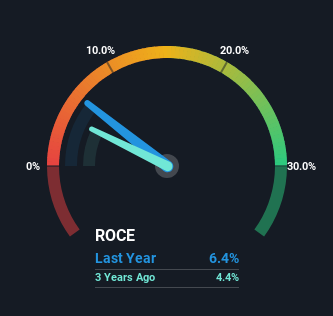- United States
- /
- Interactive Media and Services
- /
- NasdaqGS:BIDU
Baidu (NASDAQ:BIDU) Is Reinvesting At Lower Rates Of Return

There are a few key trends to look for if we want to identify the next multi-bagger. In a perfect world, we'd like to see a company investing more capital into its business and ideally the returns earned from that capital are also increasing. Ultimately, this demonstrates that it's a business that is reinvesting profits at increasing rates of return. Although, when we looked at Baidu (NASDAQ:BIDU), it didn't seem to tick all of these boxes.
What Is Return On Capital Employed (ROCE)?
For those that aren't sure what ROCE is, it measures the amount of pre-tax profits a company can generate from the capital employed in its business. To calculate this metric for Baidu, this is the formula:
Return on Capital Employed = Earnings Before Interest and Tax (EBIT) ÷ (Total Assets - Current Liabilities)
0.064 = CN¥21b ÷ (CN¥406b - CN¥81b) (Based on the trailing twelve months to June 2023).
So, Baidu has an ROCE of 6.4%. In absolute terms, that's a low return but it's around the Interactive Media and Services industry average of 7.0%.
View our latest analysis for Baidu

In the above chart we have measured Baidu's prior ROCE against its prior performance, but the future is arguably more important. If you'd like, you can check out the forecasts from the analysts covering Baidu here for free.
The Trend Of ROCE
When we looked at the ROCE trend at Baidu, we didn't gain much confidence. To be more specific, ROCE has fallen from 11% over the last five years. Meanwhile, the business is utilizing more capital but this hasn't moved the needle much in terms of sales in the past 12 months, so this could reflect longer term investments. It may take some time before the company starts to see any change in earnings from these investments.
The Bottom Line On Baidu's ROCE
Bringing it all together, while we're somewhat encouraged by Baidu's reinvestment in its own business, we're aware that returns are shrinking. And in the last five years, the stock has given away 38% so the market doesn't look too hopeful on these trends strengthening any time soon. In any case, the stock doesn't have these traits of a multi-bagger discussed above, so if that's what you're looking for, we think you'd have more luck elsewhere.
One more thing to note, we've identified 1 warning sign with Baidu and understanding this should be part of your investment process.
For those who like to invest in solid companies, check out this free list of companies with solid balance sheets and high returns on equity.
Valuation is complex, but we're here to simplify it.
Discover if Baidu might be undervalued or overvalued with our detailed analysis, featuring fair value estimates, potential risks, dividends, insider trades, and its financial condition.
Access Free AnalysisHave feedback on this article? Concerned about the content? Get in touch with us directly. Alternatively, email editorial-team (at) simplywallst.com.
This article by Simply Wall St is general in nature. We provide commentary based on historical data and analyst forecasts only using an unbiased methodology and our articles are not intended to be financial advice. It does not constitute a recommendation to buy or sell any stock, and does not take account of your objectives, or your financial situation. We aim to bring you long-term focused analysis driven by fundamental data. Note that our analysis may not factor in the latest price-sensitive company announcements or qualitative material. Simply Wall St has no position in any stocks mentioned.
About NasdaqGS:BIDU
Baidu
Provides online marketing and non-marketing value added services through an internet platform in the People’s Republic of China.
Flawless balance sheet and undervalued.
Similar Companies
Market Insights
Community Narratives



